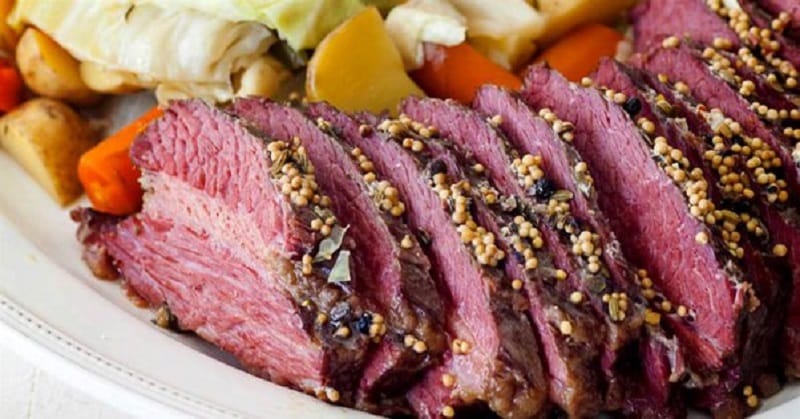Corned beef, a celebrated dish with Irish-American roots, especially popular around St. Patrick’s Day, has always been subject to much culinary debate. One of the most common questions surrounding this savory, salt-cured beef is: can you overcook it?
This article aims to delve into that query, shedding light on the nuances and offering insight into achieving this dish’s perfect balance of flavor and texture.
The Basics of Corned Beef
Corned beef traditionally starts as a brisket that is cured or brined in a solution of water, salt, and various seasonings, including garlic, bay leaves, cloves, allspice, and mustard seeds. The “corn” in corned beef refers to the large grains, or “corns” of rock salt used in the brining process.
This preparation is crucial for understanding its cooking dynamics, as the brining process affects the meat’s flavor and texture.
The Cooking Process

Source: https://www.quora.com/
Corned beef is typically cooked through a slow, moist cooking process such as simmering or braising. This method is favored because it gently breaks down the tough connective tissues in the brisket, transforming it into a tender, flavorful dish. The key is maintaining a low and steady temperature, making the meat tender without becoming overly soft or mushy.
Understanding Overcooking
So, can you overcook corned beef? The short answer is yes. While slow cooking is the pathway to achieving tender, a fine line exists between perfectly cooked and overcooked. Overcooking it can result in a few undesirable outcomes:
- Toughness: Ironically, cooking for too long can make it tough again. When cooked beyond the optimal point, the meat loses its moisture, and the fibers may tighten up, resulting in a chewier texture.
- Dryness: Alongside becoming tough, overcooked dishes can also become dry. After the connective tissues break down, cooking the meat can cause it to lose fatty content and moisture, making it less juicy and palatable.
- Flavor Loss: Overcooking can diminish the nuanced flavors of the spices and seasonings used in the brining process, leaving it bland and less flavorful.
Tips for Perfect Corned Beef
Avoiding overcooking requires attention and care. Here are some tips for preparing corned beef that is tender, moist, and full of flavor:
- Low and Slow: Maintain a low simmer throughout cooking. Boiling can cause the meat to become tough quickly.
- Use a Thermometer: A meat thermometer can help ensure your dish reaches but does not exceed its ideal internal temperature of 145-180°F (63-82°C), depending on your desired level of tenderness.
- Rest Before Slicing: Allow it to rest for at least 20 minutes after cooking. This lets the juices redistribute throughout the meat, yielding a moister final dish.
- Slice Against the Grain: For the tenderest eating experience, slice your dish against the meat’s grain. This shortens the muscle fibers, making the meat easier to chew.
Conclusion
In cooking this dish, there certainly is such a thing as too much of a good thing. While slow cooking is key to achieving tender, flavorful meat, vigilant monitoring is necessary to avoid crossing into the territory of toughness and dryness associated with overcooking.
By understanding the delicate balance required in the cooking process and following the tips, you can ensure your corned beef remains a celebrated centerpiece at your next gathering.

Welcome to the captivating world of Tusks Bar and Grill, an East African Fusion restaurant nestled in the heart of Calgary, Canada. Tusks Bar and Grill is a culinary gem that brings together the vibrant flavors and rich culinary traditions of East Africa, creating a truly unique and unforgettable dining experience.